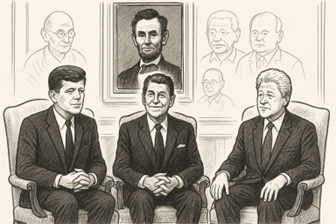



“Once a stage for wisdom and courage, today a theatre for chequebooks and threats.”
By Ravishankar Kalyanasundaram
The Oval Office is not just a room. It is a witness. Its walls have heard the whispers of statesmen, the confessions of generals, the hopes of peacemakers, and the ambitions of empire. If those walls could speak, they would tell a story not only of American power but of the conscience and contradictions of our age.
There was a time when the visitors it received carried with them more than the weight of office. They brought words that echoed beyond the moment, words that gave history a turn.
When Wisdom Entered the Room
In the early 1960s, John F. Kennedy welcomed a frail figure from India — C. Rajagopalachari, the last Governor-General of independent India, known simply as Rajaji. The Cold War was at fever pitch, and the nuclear race seemed unstoppable. Rajaji, soft-spoken and elderly, spoke to Kennedy of disarmament, of the folly of stockpiling weapons that could never truly be used, of the moral burden that sat on the shoulders of powerful nations.
Kennedy, not known for sentimental excess, later confessed that Rajaji’s counsel was “the greatest wisdom ever to enter his ears.” Imagine that: in the most powerful office in the world, the American President bowed to the conscience of a philosopher-statesman from a young democracy. Greatness, in that moment, was measured not in armies but in restraint.
When Courage Was Contagious
Decades later, Nelson Mandela, newly freed after 27 years in prison, sat with Bill Clinton in that same office. The world expected anger, perhaps bitterness. Instead, Mandela spoke of reconciliation, of his determination to forgive the jailors who had broken his body but not his spirit. Clinton, visibly moved, said afterwards that he had never been in the presence of such magnanimity. For a brief moment, the Oval Office reflected not just power but grace.
And in the 1980s, Ronald Reagan and Mikhail Gorbachev sat across each other in tense, cautious meetings that eventually pried open the doors of the Cold War. Those encounters were not easy; mistrust filled the air. But the Oval Office witnessed something extraordinary — two adversaries daring to imagine that walls could fall, that enemies could shake hands, that the doomsday clock could be pushed back.
These meetings are remembered not for the theatre of protocol, but for the courage of vision.
And Then, Today
Fast forward to September 2025. The same White House, the same chair of the Presidency, the same symbols of democracy. Yet the music is different. Donald Trump welcomes Pakistan’s Prime Minister Shehbaz Sharif — and, more tellingly, General Asim Munir, the Army Chief.
In most democracies, the general would stand discreetly in the background. In Pakistan, khaki has always been the central character, and the White House played along. Trump praised Munir as a “great man.”
And what had Munir just declared? That without Pakistan’s vigilance, New York and Washington would have been crawling with terrorists. The man whose institution has for decades played both arsonist and fireman now wore the mantle of saviour. Greatness, once measured by wisdom and sacrifice, was now bestowed for perfecting the trade of menace and its containment.
It Can Only Tell a Story
If only the Oval Office could tell its story, what would it say? It has heard Rajaji plead for restraint, Mandela plead for reconciliation, Gorbachev plead for peace. And now it hears a general plead for recognition of his leverage over terror.
It would remember Kennedy, touched by wisdom. It would recall Clinton, moved by forgiveness. It would whisper of Reagan and Gorbachev, sketching peace from mistrust. And it would compare that memory to the sight of an American President awarding “greatness” to a leader whose influence is built on keeping crises alive.
This is not statesmanship. It is commerce in insecurity. A nation where a portion of GDP is underwritten by state-sponsored militancy now exports its generals to the world’s most powerful office, where they barter reassurance for the cheque book.
The Oval Office is the same. The Presidency is the same. The democracy is the same. But the spirit of its meetings has shifted. Where once the room echoed with pleas for restraint and peace, it now resounds with bargains struck in the currency of fear.
It is not in the global interest — nor in the wisdom of American democracy — to pet leaders from the land to which so many terror strikes trace their roots. Not wounds crying out for justice, but wallets enriched by sustaining the very instability they claim to guard against.
Where are we going, when greatness is no longer earned by vision but awarded to those who perfect the art of menace?
If only the Oval Office could tell its story, it might answer with a sigh.